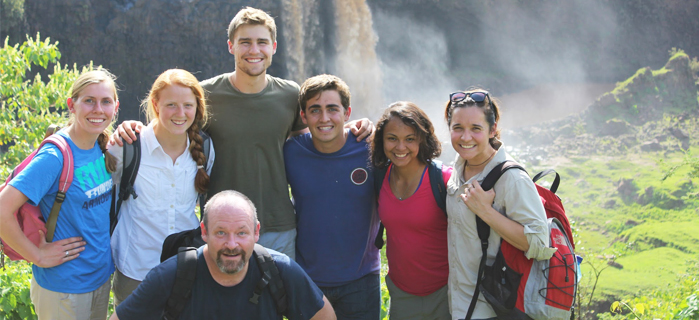Mark Reese is used to working in tough environments. After observing the difficult living conditions of the Navajo and Hopi reservations in Arizona where he attended college, he joined the Peace Corps to work with local and marginalized communities. He continued to work in nontraditional locales such as in Afghanistan after the events of September 11th finding that he thrived on challenging his definitions of the world and stretching the limits of his own comfort zone.
Now the Director of the US Naval Academy's Center for Regional Studies, Mark's penchant for challenging work in local cultures is how a group of six US Naval officers-in-training recently found themselves deep in the landlocked country of Ethiopia, exploring tribal villages, researching the relationship between religion and the multitude of cultures, and learning phrases in Amharic and indigenous languages. Mark's students plunged into the deserts and grasslands of Ethiopia, asking questions like what it means to be an Ethiopian and how regional identities play into national politics.
Preparation for Future Careers
These students are not typical college students: they are midshipmen, US Naval officers-in-training at the US Naval Academy. The United States Navy has long recognized the impact international education has on the worldview and global skillset of their officers that's why the United States Naval Academy's Center for Regional Studies aims to prepare graduates with a strong global orientation and the skills to problem-solve across cultures. Mark personally believes that "If a Naval officer has a worldview that is less egocentric and understands the human terrain around them, they will be much more likely make informed decisions both in life and in the workplace." Since so many Naval officers end up stationed around the world, it is essential they are able to thrive in cultures completely unlike their own.
Over a course of three weeks in an immersion environment, Mark accompanied six midshipmen to Ethiopia where they took language classes, listened to lectures on the history of religion in Ethiopia, learned about the distinguishing features of the regional identities that exist across the country, and explored the north/south political divide. They traveled from the capital, Addis Ababa to distant tribal villages in the south, to the more developed and fertile lands of northern Ethiopia experiencing the multitude of cultures and identities that exist across the country.
In the Omo Valley, a diverse and remote region in southern Ethiopia that is home to over 200,000 tribal people, the students explored cultural identity in the villages with local guides. It was there that Mark told them: "If you think it is hot and difficult now, try this in your future work. You're getting a sense of the challenges you will face when you encounter a people whose language and beliefs are very distant from your own."
Diplomatic Encounters
The midshipmen also met Reuben Brigety, the US Ambassador to the African Union. Ambassador Brigety invited fellow Ambassadors from countries in Africa, Europe, and South America from the Addis Ababa diplomatic community to meet with the midshipmen, exposing the students to different perspectives on the role of the African Union. Ambassador Brigety, a former US Naval officer, raised the bar for the midshipmen in terms of what will be expected of them during their future careers as representatives of the United States.
Cultural Takeaways
Not only did the midshipmen extensively prepare for their trip to Ethiopia through lectures, books, and art exhibits, but each student was also required to produce a research paper on language, culture, and identity and present their findings after their return. The assessment so far is that the students were amazed to have pulled off such a trip with a lasting understanding of how to interact with and understand cultures completely unlike their own.
About the United States Naval Academy's Center for Regional Studies
The United States Naval Academy's Center for Regional Studies serves to enhance the educational opportunities of midshipmen through support for the study of different regions of the world, curricular innovation, and community outreach. Comprised of regional fora focusing on a variety of geographical areas, the Center helps constituent Academy faculty members expose future Navy and Marine Corps officers to the array of disciplines that pursue a comprehensive understanding of regional and international dynamics across the globe. The Language, Regional Expertise, and Culture Program in Ethiopia was funded by the US Naval Academy's International Program Office.
About Custom Study Abroad Programs
American Councils worked with the United States Naval Academy's Center for Regional Studies to design and administer the Language, Regional Expertise, and Culture Program in Ethiopia.
Interested in developing a program tailored specifically to your students? Our on-the-ground network in over 26 countries makes it easy for you to focus on the big picture while we take care of the details. Start planning today: contact American Councils Outbound for more information.

